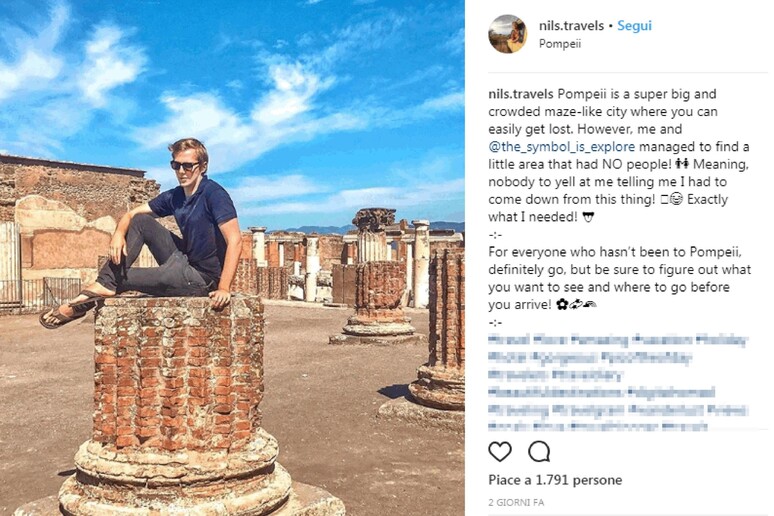A young French tourist has taken a
photo on the base of one of the columns of the Basilica in the
Pompeii archaeological site and posted it on social networks,
setting off a rash of criticism and scorn, especially among tour
guides and those working in the field.
Vincenzo Marasco from the Centro Studi Storici Nicolò
D'Alagno reported the photo to those working at the
archaeological site.
Marasco has also set up a social network site that local
history scholars living in the Vesuvius area have signed up to.
"Never lower your guard against imbecility" he wrote in a
post that includes the photo of the young French tourist. "Our
cultural heritage should be preserved in an unconditioned manner
and those directly tasked with doing so should be helped, when
necessary, by the many volunteers and scholars who devote their
time to the most important and precious things that Italian
history has left to us. Let's work together against those deface
and do not care about the value of our monuments!!".
The "too relaxed" behavior of the French tourist in the
spectacular Roman city of some 2,000 years ago is not an
isolated case. Take a look at social networks and you will find
many similar examples."
The French tourist's photo was reminiscent of another
incident at another site in which there was the same distinct
tactlessness. That time, however, it was a group of young girls
who took of photo of themselves on the throne at the Naples'
royal palace.
This photo also went viral online in May and showed four
participants of a festival that was being held at the monument.
The girls were wearing 12-inch heels on ancient rugs, well
beyond the protective cordons.
The selfie sparked debate on an age-old issue: that of
whether monuments of great historical value should be open for
social events.
But it is Pompeii - where several extraordinary discoveries
have been made recently - that is leading the "rankings" in
inappropriate behavior by visitors. Many visitors have reached
out and touched or picked up things there that they shouldn't,
unable to resist the beauty of this city that remained almost
entirely intact thanks to the ash of the 79 AD eruption of
Vesuvius.
The latest case was on May 11, when a 52-year-old French
visitor was found with 13 fragments of terracotta taken from the
excavation site in his bag during a check. The security guards
saw him near the "Casa Loreto Tiburtino" and stopped him.
He was later arrested by the Carabinieri, along with a
50-year-old woman, on theft charges.
The woman had also taken a "souvenir": a 17 cm x 7 cm
fragment of Roman-era marble that she had hidden in her bag.
ALL RIGHTS RESERVED © Copyright ANSA











